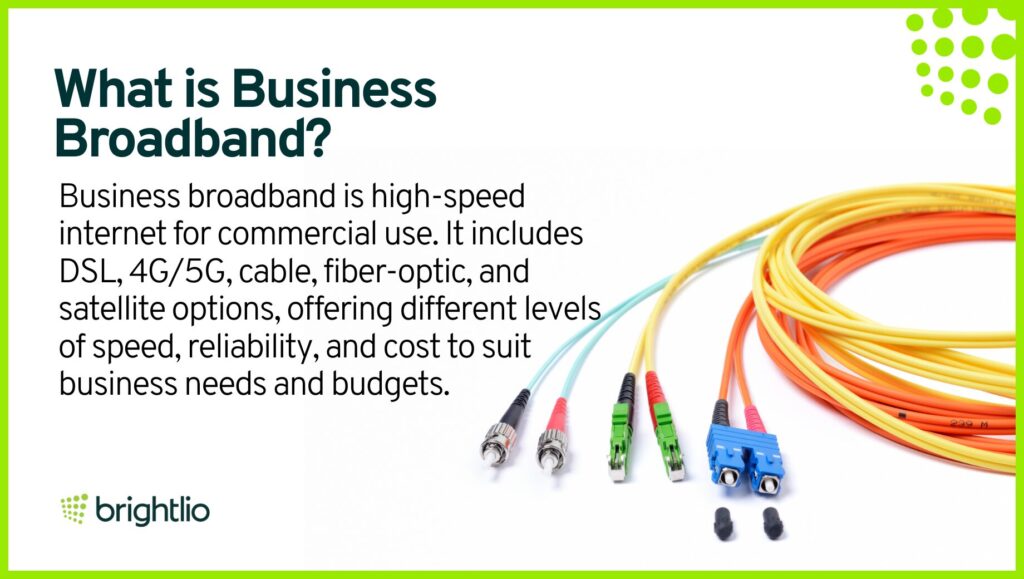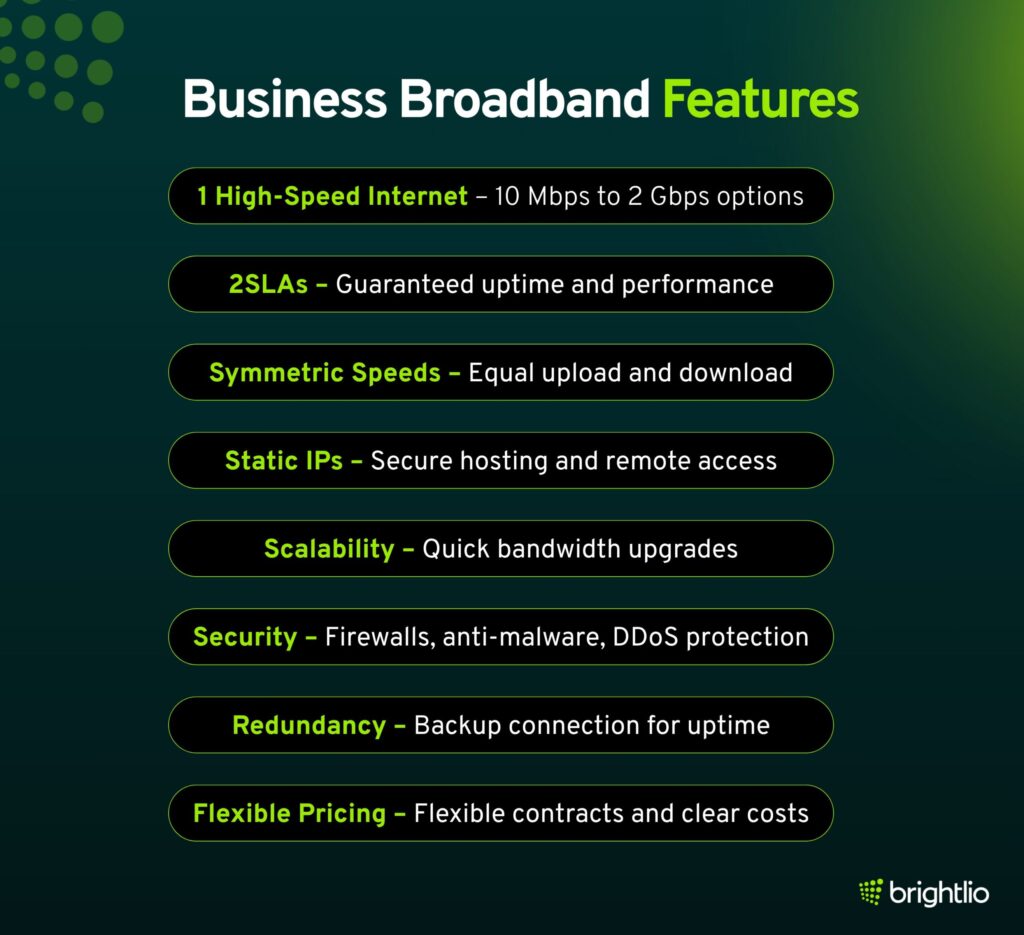
Table of Contents
Business Broadband Solutions: The Ultimate Guide
Reliable and fast internet connectivity is a cornerstone of business operations today. Whether it’s for maintaining day-to-day communications, facilitating large data transfers, or enabling sophisticated cloud-based applications, broadband services play a crucial role in the success and efficiency of modern businesses. This reliance on internet services means choosing the right business broadband solution is an important decision.
This article explores business broadband solutions, offering insights into what businesses must consider when selecting a service provider. We will discuss the various types of broadband available, key features that differentiate business-grade services from residential services, and guide how to evaluate providers and their offerings. By understanding these elements, businesses can pick the optimal internet service for their needs and budget.

What is Business Broadband?
Business broadband is a specialized high-speed internet service designed specifically for commercial use. It encompasses a variety of internet service types, including DSL, 4G/5G, cable, fiber-optic, and satellite.

Each offer distinct advantages in terms of speed, reliability, and cost efficiency. This diversity allows businesses to select the most suitable broadband solution that aligns with their specific operational needs and budget.
Common Types of Business Broadband
- DSL (Digital Subscriber Line): Offers internet through telephone lines and is widely available but generally slower compared to other types.
- Cable: Uses cable television infrastructure to provide internet. It’s faster than DSL but can suffer from congestion if many users in the same area access the service simultaneously.
- Fiber-optic: The fastest type of broadband, using modern fiber-optic technology to deliver internet. It provides very high speeds and is the best option for heavy internet usage. Fiber internet is not available in all areas.
- Satellite: Useful for rural areas where other forms of broadband aren’t feasible. While it covers wide areas, it typically has higher latency and lower speeds compared to fiber-optic or cable.
- 4G / 5G Wireless: Leverages cellular network technology to provide internet access. While 4G offers reliable speeds suitable for most day-to-day business operations, 5G technology significantly enhances capabilities, offering extremely high speeds and lower latency comparable to fiber-optic connections. 5G is particularly advantageous for businesses requiring high mobility or those in areas where traditional broadband infrastructure is lacking.
Broadband vs. Dedicated Internet
Understanding the distinction between typical business broadband and dedicated internet access (DIA) is crucial for businesses that depend heavily on reliable and consistent internet connectivity. Here are the key differences to consider when deciding between these two types of services:

Shared vs. Private Connection
- Broadband: Broadband services typically offer a shared connection among multiple users within the same geographic area. This can lead to variable speeds, especially during peak usage when many users are online simultaneously.
- Dedicated Internet Access (DIA): DIA provides a private connection exclusively used by your business. This exclusivity ensures that your internet speed and bandwidth are consistent and not influenced by other users.
Reliability and Uptime
- Broadband: While broadband providers strive for high uptime, the reliability can sometimes be less than that provided by DIA due to the shared nature of the service and other infrastructural dependencies.
- Dedicated Internet Access (DIA): DIA often comes with stringent SLAs that guarantee a higher level of uptime, typically upwards of 99.99%. This makes it ideal for businesses that require constant, uninterrupted connectivity.
Cost Considerations
- Broadband: Generally less expensive than DIA, making it a more viable option for small to medium-sized businesses or those with less critical reliance on constant internet access.
- Dedicated Internet Access (DIA): More costly than broadband due to the dedicated resources allocated to the service. However, the investment can be justified for businesses that depend on high availability and consistent performance.
Suitability for Business Needs
- Broadband: Suitable for businesses with flexible connectivity needs that can tolerate some level of variability in internet speed and downtime. It is ideal for general business operations, browsing, and email communications.
- Dedicated Internet Access (DIA): Essential for businesses that rely on internet connectivity for critical operations such as cloud services, VoIP, hosting servers, and online transactions, where constant connectivity and speed are crucial.
This distinction between broadband and dedicated internet access is vital when considering the specific needs and budget of a business. Companies must assess their operational requirements and determine which type of internet service aligns best with their critical activities and growth aspirations. Choosing the right type of internet connectivity can have a significant impact on a business’s operational efficiency and overall success.

Key Features of Business Broadband Solutions
When choosing a business broadband solution, it is crucial to consider several key features that can significantly impact the efficiency and functionality of your business operations. Here are the most essential features to look for:

1. High-speed Internet
Speed is one of the primary considerations for any business broadband service. Depending on the size of the business and its specific needs, the required speed can vary greatly. For instance, companies that rely heavily on online transactions, cloud-based applications or have a large number of simultaneous users will need faster speeds to maintain optimal performance.
Broadband connections typically range from 10 Mbps to 2 Gbps. These days, many affordable 1 Gig connection speed options are available. Availability will depend on your service location.
2. Service Level Agreements (SLAs)
SLAs are formal agreements between service providers and customers that define the level of service expected during the contract term. For businesses, SLAs are critical as they guarantee minimum service performance and uptime and offer compensation in case of service failures. This is particularly important for businesses where downtime can lead to significant losses.
Business broadband internet typically offers a better SLA than residential internet service. If you need a strict SLA to protect and compensate your business from downtime, you should consider a dedicated internet connection.
3. Symmetric Upload and Download Speeds
Symmetric internet speeds are essential for businesses that perform a lot of high-volume uploads, such as sending large files, hosting servers, or using cloud services extensively. They ensure that upload activities do not bottleneck operations, allowing for smoother, more consistent internet usage.
Some broadband internet services offer symmetrical services. Others provide faster download speeds than upload speeds. Business internet plans will outline this in the contract.
4. Static IP Addresses
A static IP address is a permanent internet address that does not change over time. Having a static IP can be crucial for businesses that host their own email servers, web servers, or need to securely access IT environments remotely. Static IPs facilitate reliable server hosting, VOIP services, and enhanced security measures.
5. Scalability
The ability to scale services quickly and efficiently is vital as business needs change. Good business broadband solutions offer flexible scalability options that allow companies to increase their bandwidth as they grow without significant disruptions or complex transitions.
6. Security Features
With the increasing frequency and sophistication of cyber threats, security has become a paramount concern for any business internet solution. Providers that offer built-in security features such as firewalls, anti-malware tools, SD-WAN, and DDoS protection add an essential layer of defense, safeguarding business data and communications.
Many business internet plans offer optional managed network services. With managed services, the provider will provide and manage a router, firewall, switch, or wireless access point. These plans often include professional installation. These plans are perfect for small business owners or remote branch offices that may not have on-site IT resources.
7. Redundancy
For businesses that need near-continuous uptime, broadband redundancy is critical. Automatic failover to a secondary connection keeps operations running even when one line goes down. This capability is particularly important for healthcare, finance, and e-commerce organizations where downtime can cause significant disruptions.
8. Pricing and Contract Terms
Compare the pricing models of different providers to find the best value for your business. Look at the overall cost, including installation fees, equipment costs, and any hidden charges. It’s also important to understand the contract terms, such as the length of the contract, penalties for early termination, and conditions for service renewal. Many business broadband providers offer month-to-month contract terms, giving you the flexibility to cancel at any time.

Differences Between Business and Residential Broadband
Business broadband solutions are distinct from residential broadband in several crucial ways:
- Speed and Capacity: Designed to accommodate higher speeds and greater capacity, business broadband supports extensive activities like video conferencing, large file transfers, and numerous simultaneous users.
- Symmetrical Speeds: Business broadband often features symmetrical speeds, where upload and download speeds are equal. This facilitates the efficient handling of large uploads and real-time data processing.
- Reliability and Uptime: The need for consistent and reliable internet access in business means that providers typically offer service level agreements (SLAs) with their business broadband, ensuring specific levels of uptime and rapid issue resolution.
- Customer Support: Enhanced customer support is a hallmark of business broadband, including 24/7 technical support and dedicated account management, essential for quick problem-solving and minimizing operational disruptions.
Conclusion
In conclusion, the selection of a business broadband solution is a strategic decision that impacts every facet of your business operations. By understanding and carefully considering the various types of broadband available, the features that are most critical to your business, and the offerings from various providers, you can make a choice that not only meets your current business requirements but also supports your future growth and success.
This guide has provided a comprehensive overview to help navigate the complex landscape of business broadband. With the right approach, businesses can leverage their broadband solution as a powerful tool to enhance operational efficiency, improve customer satisfaction, and drive business growth. The key is to choose a solution that aligns with both your operational needs and financial constraints, ensuring a scalable, secure, and reliable internet service.
Remember, the internet is the backbone of the modern digital business environment. Invest wisely in your broadband solution, and it will pay dividends in enabling your business to thrive in an increasingly connected world.
Business Broadband Solutions From Brightlio!
If you are looking for internet for your business, Brightlio can help. As a telecommunications broker, we several our global network of internet service providers to deliver the internet service for your needs and budget. Whether you are looking for a business broadband package or dedicated internet, we will deliver a reliable internet connection.
Additionally, we offer cloud solutions, colocation, unified communications, value-added resale, and advisory services. This means we can deliver a complete technology solution for your business. Brightlio is committed to being your most trusted and responsive technology solution provider. Get started with your new business internet solution today!

Broadband Business Internet Solutions FAQ
1. What is business broadband and how does it differ from residential internet?
Business broadband is a commercial-grade internet service designed for companies. It offers faster and often symmetrical speeds, stronger SLAs (Service Level Agreements), enhanced security, and dedicated support—features typically not available with residential connections.
2. What connection types are available for businesses?
Common options include fiber-optic, cable, DSL/xDSL, and fixed wireless (including 5G FWA). Fiber provides the highest speeds and lowest latency, while fixed wireless is ideal when fiber isn’t available or as a rapid failover solution.
3. Why choose symmetrical upload and download speeds?
Symmetrical speeds support heavy upstream requirements like large file transfers, cloud backups, video conferencing, and hosting services—ensuring consistent, reliable performance.
4. How important are Service Level Agreements (SLAs)?
SLAs provide uptime guarantees and prioritized issue resolution—crucial for businesses reliant on constant connectivity. For mission-critical use, many recommend dual connections or SD‑WAN overlays to ensure continuous access.
5. What security benefits does business broadband include?
These services often include dedicated firewalls, intrusion detection, antivirus, and optional VPNs. Enhanced encryption and monitoring are essential for protecting sensitive data and complying with regulations.
6. When is fixed wireless access (FWA) a good option?
True fixed wireless is ideal in areas lacking fiber or when quick deployment is needed. It offers enterprise-grade SLAs and performance, and is useful as a failover solution. Conversely, 5G-based FWA may suffer congestion and data caps.
7. How can businesses support hybrid/remote work with broadband?
Solutions include SD‑WAN for efficient routing across multiple connections, secure VPNs, and cloud-based apps. These ensure employees enjoy consistent connectivity and performance anywhere.
8. What industry trends should businesses watch in 2025?
Key trends include AI-driven network management, expanded fiber rollout, growth in 5G and fixed wireless, Wi‑Fi 7 adoption, enhanced cybersecurity, and digital equity efforts.
9. What are the costs and scalability considerations?
Business-grade connectivity typically costs more than residential service. However, it’s scalable—letting companies upgrade bandwidth quickly as needed, avoiding disruptions and overpaying during slower periods.
10. How do I choose the right provider?
Assess factors like number of users/devices, types of online activities (e.g., video conferencing, cloud apps), peak hours, future growth, required speeds, security needs, and SLA levels. Compare offerings and check for static IPs, redundant routing, and support quality.
11. How do internet plans vary between different business internet providers?
Internet plans can vary greatly between providers in terms of speed, data limits, cost, and the type of connection (e.g., DSL, wireless broadband, fiber internet). Some providers may offer unlimited data plans, which are beneficial for businesses that need to upload large files or use high amounts of data regularly.
12. What are the advantages of fiber internet for small businesses?
Fiber internet offers higher speeds and more reliable internet connections, which are crucial for activities that require significant bandwidth such as video conferencing or uploading large files. Fiber internet also tends to have better uptime and less latency, enhancing overall business continuity.
13. How important is it for a business internet plan to include service level agreements (SLAs)?
Including SLAs in a business internet plan is crucial as it guarantees certain levels of service, uptime, and support from your internet service provider. This is especially important for maintaining business continuity and ensuring that any issues with your internet connection are swiftly addressed.
14. Can small businesses benefit from wireless broadband?
Yes, small businesses can benefit significantly from wireless broadband, especially if they are in a location where traditional wired connections are not available or are too costly. Wireless broadband can offer sufficient speeds for many small business needs and can be easier and quicker to install.
15. What should businesses know about uploading large files and internet connection types?
Businesses that frequently need to upload large files should consider internet plans that offer high upload speeds, which are often found in fiber internet plans. High upload speeds are crucial for ensuring efficient file transfers, backing up data, and maintaining regular business operations without disruptions.
16. What percentage of businesses use broadband as their primary internet solution?
As of 2024, approximately 92% of businesses in the U.S. rely on broadband as their primary internet connection. Fiber broadband adoption has grown rapidly, accounting for 38% of business broadband users, while cable and DSL still cover 54% combined. Only 8% use mobile-only or satellite options.
17. How does broadband speed affect business productivity?
A study by the FCC found that businesses with broadband speeds of 100 Mbps or higher experience 31% faster cloud application performance and 20% higher employee productivity compared to those using speeds under 25 Mbps. Additionally, companies upgrading from legacy DSL to fiber often report a 40% reduction in downtime.
18. What are the typical costs for business broadband in 2025?
Average monthly costs for business broadband vary by speed and technology:
- Fiber broadband (1 Gbps): $300–$600/month
- Cable broadband (500 Mbps): $150–$300/month
- DSL (50 Mbps): $50–$150/month
Companies with multi-site operations often spend 15–25% more for redundancy and dedicated service-level agreements (SLAs).
19. How reliable are business broadband connections?
Business broadband connections typically achieve 99.9% uptime, translating to about 8.7 hours of downtime annually. Fiber-based solutions often guarantee 99.99% uptime, reducing downtime to less than an hour per year when backed by strong SLAs. This reliability is critical for industries like finance and healthcare.
20. What bandwidth is recommended for different business sizes?
Recommended bandwidth by business size (average use):
Large enterprises (50+ employees): 1–10 Gbps depending on cloud, VoIP, and video needs.
Businesses using real-time video conferencing or heavy cloud workloads may need 30–50% more bandwidth than typical benchmarks.
- Small offices (1–10 employees): 100–300 Mbps
- Medium businesses (11–50 employees): 500 Mbps–1 Gbps

John Minnix is the Founder and CEO of Brightlio, with two decades of experience in data center, cloud, and network solutions. He previously built VPLS Solutions into a top Southern California technology partner before its acquisition by Evocative, where he served as President and COO overseeing global sales, operations, and strategic acquisitions.
Recent Posts
10 Largest Underground Data Centers in the World
100+ VoIP Statistics from Credible Sources (Jan – 2026)
10 Largest Data Centres in the UK
Data Centers in Maine – An Overview
Let's start
a new project together



